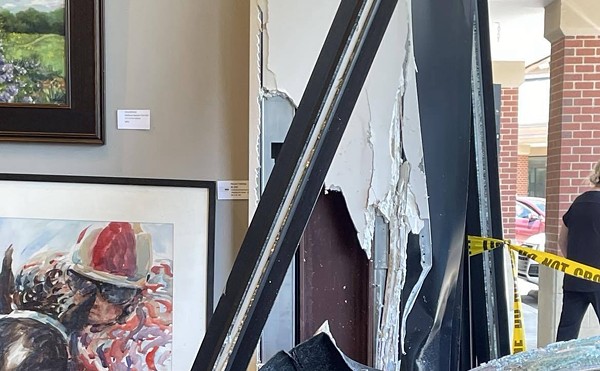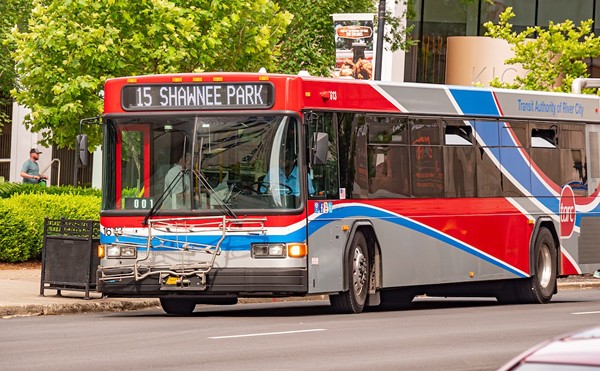Darlene Kelly was at home with her 83-year-old mother when the trouble started. A contingent of Louisville Metro Animal Services officers had arrived on her property and informed Kelly, a longtime volunteer with MAS, that they received a complaint from a neighbor about her dogs. If she didn’t open up, the officers told her, they would be forced to confiscate her pets.
“The complaint was that I had a lot of dogs,” says Kelly, whose job as founder of the state-licensed Advocate 4 Animals rescue group has her boarding multiple animals at a time. “There were no complaints about them attacking anybody or about them getting out, just that I apparently have too many. The ordinance says nothing about having ‘too many animals’ if they’re properly licensed.”
Upon opening the front door to speak with the animal control officers, Kelly says the lead officer swung open the outer screen door and barged in, leading the uninvited throng into her home without a warrant.
The animal control officers told Kelly she would need to license her two rescued dogs (which it turns out didn’t need licensing because Kelly was nursing the animals to health with the intention of giving them away) and that her home’s standards of cleanliness weren’t up to snuff.
“It’s funny they would cite me on cleanliness,” she says. “I went out to their shelter just a month ago. There was a pit bull that had three piles of feces in its cage. I pointed it out to some people, and a few hours later no one had cleaned it up.”
When all was said and done, the case against Kelly was dismissed — but not before she registered a complaint of her own with the Louisville Kennel Club, whose president, Donna Herzig, says they’ve been getting more reports of illegal searches and seizures conducted by animal control officers than she can count.
“I can’t even tell you how many calls we’ve received this year,” says Herzig. “But we’ve gotten them, (our attorney) Jon Fleischaker has gotten them, too. It’s a jack-booted, kill-all-the-animals, make everyone afraid of us approach, just like they operated under Meloche.”
Herzig is referring to the spate of smash-and-grabs conducted by animal control officers under the tenure of former Metro Animal Services Director Gilles Meloche, who, along with current Director Wayne Zelinsky, was named in a second sexual harassment lawsuit last week, raising questions about Zelinsky’s role in the dysfunctional state of affairs plaguing MAS.
“We’re not doing anything that is illegal,” says MAS spokeswoman Jackie Gulbe. “Our officers are doing what they’re supposed to do, which is enforcing the dog ordinance. Our staff is doing the best they can given extremely limited means.”
The majority of complaints lodged with the Louisville Kennel Club and reviewed by LEO Weekly allege that operations under Zelinsky haven’t changed much from his predecessor, and that many of the animals (particularly cats) at the 3705 Manslick Road shelter are afflicted with serious, lethal diseases — i.e. pasteurella, feline herpes, coccidia, and the incurable calicivirus — which Kelly and other sources close to the shelter say are mutating to the point of becoming untreatable.
Although Gulbe says she hasn’t heard anything about mutant feline diseases (“It sounds like a horror film,” she says), she notes that they’ve had to rearrange the cat kennels to inhibit disease communication, and that the building was never really designed to treat animals, only to house them.
“It was built to warehouse animals,” she says, “and, sadly, to euthanize them.”
Meanwhile, Herzig hopes more of these complaints will go to trial now that she and Fleischaker have deduced the Metro dog ordinance carries potential criminal liability and, therefore, allows people like Kelly access to a public defender to address grievances against MAS.
“Until these animals have a fighting chance of living,” says Herzig, “We’re not going to stop. The people in this community need to feel safe in their homes, and to not worry about someone unlawfully taking their property.”
Metro Councilman Kelly Downard, R-16, was disappointed to hear of the new round of complaints.
“That surprises me,” says Downard, who is a member (and former chairman) of Metro’s Government Accountability and Oversight Committee. “My understanding was that Capt. Zelinsky would cease and desist on this. The complaints that began (under Meloche’s tenure) were because ACOs (animal control officers) had no warrant. These ACOs are supposed to be peace officers, and they are required to follow the law like any other peace officer. To enter into someone’s home like that without a warrant is unacceptable.”
Downard also says he hasn’t heard anything about untreatable diseases, but ultimately isn’t surprised given the current conditions in which MAS employees must work.
“It should be bulldozed,” he says of the Manslick Road facility. “I don’t know how it could be remedied. It’s so dirty and old and run-down.”
He also is skeptical of whether MAS’ planned expansion facility, at 3520 Newburg Road, is big enough to relieve the problems of the Manslick shelter, and questions the decision of the mayor to appoint Zelinsky as de facto director given Zelinsky’s alleged involvement in illegal goings-on at MAS.
“It’s a mystery to me about the whole system of management out there,” Downard says. “I truly don’t understand it, but I’ll be looking into it.”





